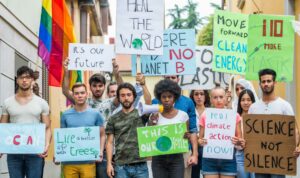Next-generation business leaders need to understand climate change risks and opportunities. A resource toolkit can help educators and students achieve this goal.
This session was part of the NBS Sustainability Centres Community (SCC) Workshop 2021. The SCC connects business school sustainability centres worldwide.
Climate change is urgent and fast-moving, and individuals can have difficulty keeping up-to-date. One solution is a collective knowledge hub, to share and disseminate best practice.
In this SCC Workshop session, presenters Lynn Schenk (Harvard Business School) and Ian Thomson (Birmingham Business School) explored the potential for such a knowledge hub, focused on business school educators.
The session discussed different ways to build understanding of climate change risks and opportunities into educational programs in schools and institutions. Participants shared approaches including stand-alone courses on business and climate change; climate change cases that can be used to teach core concepts in marketing, strategy, innovation, or other disciplines; and simulations for use inside or outside the classroom. Participants were encouraged to develop a toolkit appropriate to their situation.
Watch the Conversation
Strategies and Tools Shared
Use the Harvard Business School Course Explorer platform as a hub to share climate- related courses and associated teaching materials. The platform is open to materials from faculty across the globe.
Teach climate literacy and carbon accounting in undergraduate accounting programs. Carbon Literacy Training (supported by the UN Carbon Literacy Training Group) can be used in this way.
Use MIT Sloan’s Climate Action games. Simulations address different aspects of climate change, from negotiating policy to running a clean energy start up.
Explore country-wide pathways to decarbonization with the interactive “Create Your Pathway to a Low Carbon UK by 2050 calculator. The calculator was developed by the UK Department for Business, Energy & Industrial Strategy.
Look at individual action with ‘Carbon Cost Your Diet’ (BBC News).
Partner with others, like the Sustainable Consumption Research and Action Initiative (SCORAI). SCORAI is an international knowledge network of researchers and practitioners which advances research, spreads knowledge, affects policies and supports campaigns.
Use Carbon Copy’s cases. These feature “high-impact, low-carbon” initiatives aimed at diverse actors and areas.
Related Articles
Leichenko, R., & O’Brien, K. 2020. Teaching climate change in the anthropocene: An integrative approach. Anthropocene, 30.
Molthan-Hill, P., Worsfold, N., Nagy, G. J., Filhod, W. L., & Mifsud, M. 2019. Climate change education for universities: A conceptual framework from an international study. Journal of Cleaner Production, 226, 1092–1101.
About the SCC Workshop 2021
Every two years, the NBS Sustainability Centres Community Workshop connects leaders of business school sustainability centres for learning and action. This session was a part of the most recent Workshop in July 2021: “Designing the Business School Sustainability Centre of the Future.” See the main Workshop page for an overview and to access additional sessions.
The 2021 Workshop was hosted by the Center for Sustainability Transformation and Responsibility (STaR) at the Vienna University of Economics and Business and the Institute for Business Ethics and Sustainable Strategy (IBES) at the FH Wien University of Applied Sciences for Management & Communication.
See the Sustainability Centres Community homepage for additional information and to join the group.
Banner photo is taken by Marius Brand of WU Vienna, who gave us a great sense of what our conference would have felt like in Vienna, had it not been virtual.
About the Session Leaders
Lynn Schenk, Harvard Business School
Lynn Schenk leads the HBS Business and Environment Initiative in its mission to educate, connect, and mobilize current and future business leaders to address climate change and other environmental challenges. She does this through supporting course content creation, student and alumni engagement, career support, and partnership in developing the Climate Rising podcast. Lynn’s background is in structured finance in the energy, infrastructure, and sustainability markets, including roles at Citigroup and the Clinton Climate Initiative. Her focus continues to be on the intersection of finance and climate change, as it applies across multiple sectors and geographies.
Ian Thomson, Birmingham Business School
Ian Thomson is Professor of Accounting and Sustainability at Birmingham Business School and Director of the Lloyds Banking Group Centre for Responsible Business. Ian has been researching and teaching topics relating to responsibility, sustainability and accountability for 30 years including climate change, and carbon accountability. He has been called as an expert witness to various Scottish Parliament’s committees, appointed as advisor to Scottish Parliament’s Transport, Infrastructure and Climate Change, and Cities and Infrastructure Committee, worked with Sustainable Development Commission (Scotland), The Princes Charity, Business in The Community and as an accountability expert to UN World Food Programme. He is also Chair of the Centre for Social and Environmental Accounting Research (CSEAR) network.


Add a Comment
This site uses User Verification plugin to reduce spam. See how your comment data is processed.This site uses User Verification plugin to reduce spam. See how your comment data is processed.